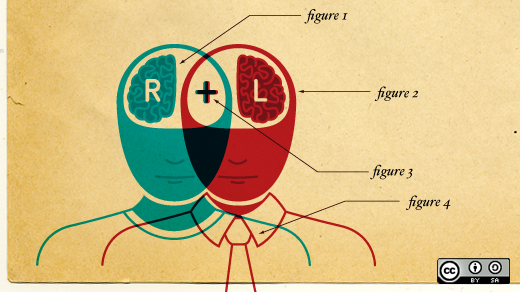At this year's Texas Linux Fest, Rackspace's Major Hayden talked to us about impostor syndrome.
Major told us the story of how he came to work in a totally new world at Rackspace. He was suddenly promoted and working with a lot of managers and leaders. He didn't have the same experience as them, so he started to fall back and felt like he didn't know as much as them.
While Major thought he was just being humble, he was actually putting himself in a situation where he wasn't getting the job done.
Impostor syndrome boils down to a one-line definition: an inability to recognize your competence.
The Dunning-Kruger Effect is the opposite of impostor syndrome, to a point of being very dangerous.
What we need is a happy medium.

It's important to understand that being unsure is not the same as being humble. Being humble is not about thinking less of yourself—you need to have an accurate self-assessment.
If your self-assessment is inaccurate, that can be a big problem. Think of people sitting around a table figuring out how to handle a world crisis. If people are unsure and don't share their opinions, it could lead to the wrong decision being made. The same is true if someone is too sure of themselves—they might end up dropping a bomb when there was a better way to handle the situation. If your confidence comes up a little bit short, you need to ask for help of those around you.
We can fix imposter syndrome with something called OODA, which stands for observe, orient, decide, and act.
Observe
- Watch the body language of other people when you talk.
- Write down your opinions and thoughts and share them with people you trust.
- Get direct feedback from peers and leaders.
Orient (This is the most critical step)
- Quantify your cognitive bias based on feedback and your experience
- Try to bring your self-assessed competence in line with your actual competence
Decide (This is the point of no return)
- Choose what you're going to do and how you will do it
- Don't go back on your decision once you make it
Act (This is "go time")
- Put your decisions into action and don't look back
- Take all the feedback you get and funnel it back into the OODA loop for the next challenging situation
Never go back up to the step before—you either drop out of the loop or go back to the top and start over. Go through this loop without thinking about anyone but yourself. Don't compare yourself to anyone else. This is all about you, your decisions, and how you want to improve.
Major ended on a great note, saying:
Wherever you are in life with whatever you're doing, you're going to be ahead of some and behind others. That's okay. Own where you are. Take time to embrace and celebrate that. Continue moving forward.
And quoting Matt Cheuvront, who said:
Never compare your beginning to someone else's middle.
Want to see all the slides? View the presentation on SlideShare.
recap
This article is part of the Texas Linux Fest series. Texas Linux Fest is the first state-wide, annual, community-run conference for Linux and open source software users and enthusiasts from around the Lone Star State.






2 Comments